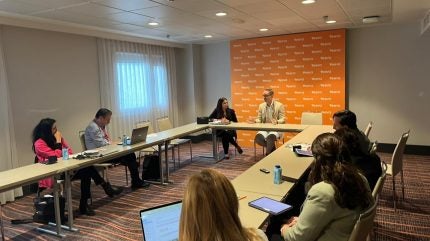
Daiichi Sankyo’s VP of digital excellence, Dr Patrick Markt-Niederreiter , has outlined how the pharma company makes ‘very conscious’ decisions about the use of data analytics.
In a media roundtable at the 2024 Veeva Commercial Summit taking place from 19-21 November in Madrid, Markt-Niederreiter discussed how the Japanese biotech collects, analyses, and uses data and new technologies.

Discover B2B Marketing That Performs
Combine business intelligence and editorial excellence to reach engaged professionals across 36 leading media platforms.
The pharma VP reflected on the data collection and sharing process around Daiichi Sankyo Germany’s partnership with the German digital therapeutics company Prosoma, which develops a European CE-certified digital health app, Living Well. The app is designed to improve patients’ quality of life and reduce symptoms of stress, anxiety and depression associated with cancer diagnosis and treatment at various stages of cancer.
Markt-Niederreiter noted: “When we partnered with [Prosoma], we made the conscious decision to only receive two types of information at an aggregated level. One, how many doctors are prescribing the app and how many patients are using the app. [The second,] is there a difference if you take the drug and use the digital therapeutic versus taking the drug”.
Markt-Niederreiter explained the reasons behind the company’s decision to not seek “all the data”. One reason being to build trust with patients, and patient trust us to usethe app, he added. “The company who developed the solution was not getting the information, but only the one of the German payers, technically, was getting the data so that they have to prove or can basically see, does it make a difference?”
“So, we made a very conscious decision on where we use analytics and which type of data we get, because what we would like to do is to make sure that at the end, we improve patient health, and doctors make better decisions for patients. And this does not mean that we need data all the time, but when we do, we do to achieve a certain goal. The goal [this time] was to maintain patient trust, make sure people use the application, and when people use the application.”

US Tariffs are shifting - will you react or anticipate?
Don’t let policy changes catch you off guard. Stay proactive with real-time data and expert analysis.
By GlobalDataThe advancements in technology have allowed companies to collect, store and analyse large amounts of data. But this has also resulted in companies gathering “too much data”.
Research conducted by Duke-Margolis Health Policy Center showed that there has been a 283.2% increase in data points collected during Phase III trials. This has put an increased emphasis on consistent and reliable data collection.
Markt-Niederreiter also noted that companies need to be purposeful in collecting data.
“[Daiichi Sankyo] has worked a lot on our ability to deal with the lack of data, because we will never have all the data we want for different reasons – it is not available, the granularity, change in customer preference since the data collection, and change in technology platform,” he said.
“So, it means understanding how you can deal with incomplete data, but still achieving a goal that has become for us a much more important skill set than just adding data sources. Because, again, if you don’t know for which purpose you are doing it, you are just accumulating data. And then you have a data break here, but nothing else.”
Markt-Niederreiter added: “Even with less data, you can do so much more with analytics and machine learning than before. You don’t need to be perfect. Aim for 80% and then you can still do great things for doctors.”





